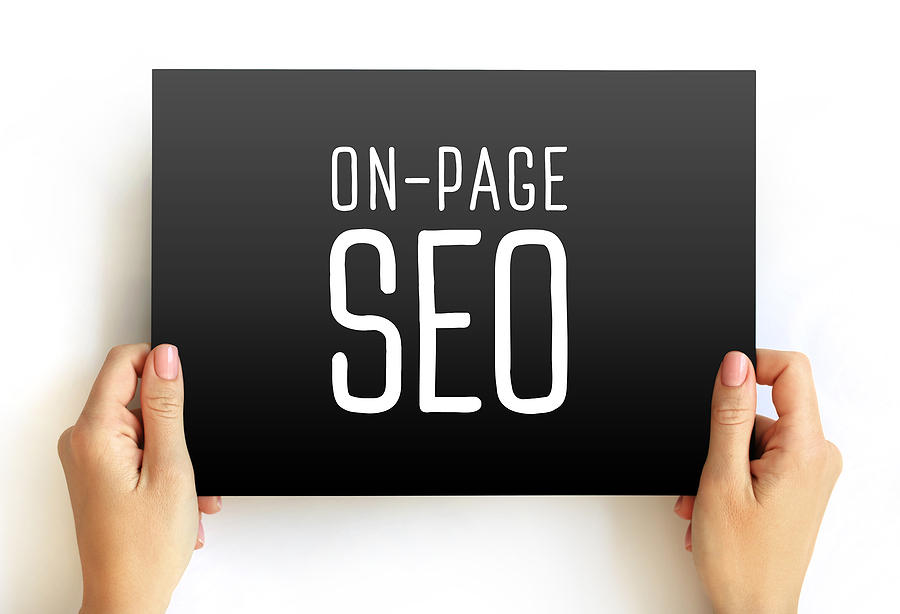The Importance of On Page SEO

What is on Page SEO?
On page SEO is the practice of optimizing a web page for Google search with the goal of earning higher web traffic levels and improving the visibility of the site. On page SEO optimization covers a variety of techniques that can be used to improve a website, including using keywords, long tail keywords and HTML tags correctly.
It also includes a competitor analysis to see what strategies they are using to rank higher than you. In this article, we'll discuss on page SEO in more detail so that you can start improving your website's performance today.
If you're a Seasoned SEO, then you may pick up a few tips. If you're a business owner working on your own website, then this will make your life a lot easier to become much more competitive - and get more business.
Three Core Elements of On Page SEO
There's always a lot of mystery surrounding the concept of on page SEO, and most of it from marketers selling you solutions. Which is fine, and can be of great help - and if you understand the fundamentals, then it all becomes rather straight forward. Let's start with the basics.
On Page SEO Has 4 Distinct Aspects:
- Content structure and written content for search engines to read and understand what your web page is about
- Content for humans to understand what your web page is about
- Content for humans to take action... called "conversion".It's content that convinces them to buy your products or services
- Content and structure relative to the competition - for search engines
Let's review each point one at a time.
On Page SEO Content Structure & Written Content for Search Engines
Search engines use "crawlers", which are web searches of your web pages, performed by the search engines' algorithm. Think of it like a person looking up a web page and trying to understand what the page is about. But the crawlers use algorithms to do the "reading".
Which means that your webpage has to "speak the language of the algorithm". Don't worry though, it's not hard, and there's no mystery behind it.
How do Search Engines Analyze a Web Page?
- They "read" the text on your web page and look for "key" words and phrases so it knows what the page is about. For example, if there are lot's of instances of the word "plumbing", and all the other content is related somehow to "plumbing", then the search engines register in their system, that your content is about "plumbing" and will seek to categorize it, or "rank" it according to other sites which are similar in content and "key" words.
- Search engines also look for topical consistency. This is important. If you don't follow this rule, you'll never rank for anything. For example, if your page focuses on plumbing services, but you have a lot of content about electrical services and HVAC services - which you or your client may actually offer, the search engine will not be able to determine whether your page is about plumbing, electrical or HVAC services. The solution is simple. Have one separate page for each service.
- Search engines also look for what location your web page is targeting. For example, if the site is about "plumbing" and is a small business site, then it would look for reference to an address, city, state, service area description, zip codes, etc., on that page - or a link to a page on your site that has that information. If there is no reference to location at all anywhere, the page will probably not show up anywhere in search results.
- Search engines also need to know what's important in the content, so you have to tell it what is important. This is where things like HTML tags come in, where you tell the search engine that certain text is your main title - the h1 tag. Sub titles are h2, and so on. If you have images, then it will check to see how your images are named, and what the "Alt" tags are so they know it relates to the written content.
- Relationships to other pages on your website, and to other websites. This is basically your "link structure". Crawlers look for links to other pages on your site, to make sure that all the pages are not only related, but cover the same "key" words. As an example, following the plumbing motif, this process authenticates your website as a site that belongs to a real plumbing company - which may offer other services, with each one covered on different "service" pages.
Content For Humans to Understand & To Take Action
This component is often overlooked in importance with almost exclusive focus on technical details when it comes to on page SEO. The reason that your content must be written well for the human, is that if it isn't, then the human visitor will leave the page without taking any action to buy something, make a call to the business, send a text or fill out a form.
After all, the purpose of any business related website is to make money. But let's take it a step further.
The search engines, in their assessment of your web pages, also factor in whether a page visitor just bounced away, or actually clicked on something to "take action". This is only peripherally related to on page SEO, but search engines attach high value for pages that people engage with, a lot. Therefore, stellar on page SEO with crappy (even if technically relevant) content will not only preclude sales, or "action" on your page, but the search engines will discount your stellar SEO efforts, by the functional reality that visitors don't engage with your page. They don't buy anything, or reach out to hire your services.
Web Page Content As Compared to the Competition
Web pages are always graded, or "ranked" against other website pages of similar content, containing similar topics, html tags and "key" words and phrases.
- If the other websites - the competition - have stellar on page SEO, and you don't, it means that the search engines will marginalize your site against the competition simply because the other sites are algorithmically "easier to understand".
- You have to "stay with the pack"... just do it a LITTLE better - don't over do it! For example, the amount of content you have on your web page, and the topics covered on that web page must be close enough to the competition that search engines see and understand that the two pages are relevant for the same searches performed by people searching the web for that particular service or product.
Final Thoughts About On Page SEO
 Taking a bird's eye view of on page SEO, if you have relevant and engaging content - which means giving the visitor the info they're looking for based on their search term, then you're 30% of the way there.
Taking a bird's eye view of on page SEO, if you have relevant and engaging content - which means giving the visitor the info they're looking for based on their search term, then you're 30% of the way there.
If you follow the few technical points I mentioned above, then you're now 60% of the way there.
If you've checked out the competition to see what they have on their web pages, how long the content is etc., and stay similar... Just do a bit more and a bit better, then you're 90% of the way there with respect to on page SEO.
There's literally a huge number of SEO tools and website auditors out there which cover the remaining 10%. Using them makes sense, since there are a few other things I didn't cover here, but even without those tools, especially as a small business owner, you become firmly competitive.
Focus on the logical fundamentals. Everything is about the fundamentals. It's the 80/20 rule. The last 20% will take you 80% more time and money to accomplish. Don't worry about being perfect. Nobody is, and more importantly, nobody even knows what perfection is.
Don't get caught up in the last 20%.
Stick to the points I covered above, and you'll see good results - search engines will show your pages in the results and your visitors will "take action".
Go get 'em!